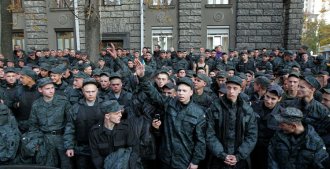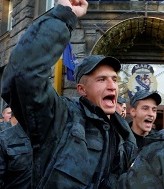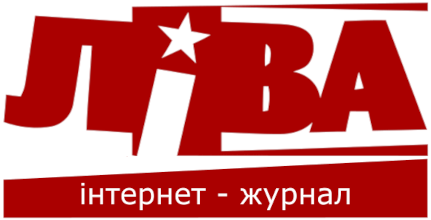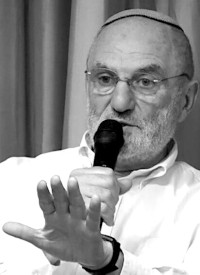
The negotiations in Milan in a sense completed a diplomatic cycle begun by the Minsk Agreement, heralding a still weak hope for de-escalation of the conflict in Ukraine. It became clear that Russian gas will be supplied to Ukraine this winter and the Poroshenko administration will be able to provide heating to the population without resorting to exotic options like South African coal or Norwegian gas via Slovakia. The format of the meetings, in which Vladimir Putin and Peter Poroshenko were able to communicate directly, bypassing the middlemen, suggests that the Ukrainian president is inclined toward a more realistic position than the one he voices in his rhetoric of propaganda.
However, it puts him in a very awkward position with the radical nationalist part of the Ukrainian population, which requires a continuation of the war. The statement by U.S. Vice President Joe Biden that that is some unspoken agreement between Putin and Poroshenko excited the Ukrainian press and once again raised the prospect of "betrayal,” which Poroshenko was “suspected of” in the past. But in spite of these pressures, the Ukrainian president has no choice. He needs Russian gas and 60 percent of voters are in favor of a peaceful settlement on any terms.
In addition, the country remains at real risk of default. The Ukrainian media are filled with stories that Ukraine has finally gotten rid of the “subsidized” regions of the East, which hung like a weight around the country’s neck and prevented its development, but Ukrainian Minister of Foreign Affairs Klimkin, speaking to more informed audience in Europe, admitted that area captured by the “separatists” in Lugansk and Donetsk produces 15% of GDP.
This, of course, does not tally with all the talks about “alcoholics and gangsters from Luganda and Donbabwe” [how middle class nationalists call industry workers of Donetsk and Lugansk implying a full of racism referring to Uganda and Zimbabwe], but to the West the officials can speak frankly. It is no secret that the propaganda machine of the Ukrainian authorities, screaming about "spongers" from the Donbass, is designed only for Ukrainian internal usage. As well as the mantra about Russia’s imminent collapse due to lower world oil prices, which all at once should save Ukraine from its troubles.
The patriotic inhabitants of social networks, who have already shown their deep knowledge of geopolitics and military affairs, now demonstrate their analytical skills in the field of energy pricing, forgetting that we have our own “oil.” About 20 percent of Ukrainian GDP came previously from metal exports. Yes, in general, the metallurgical industry in Ukraine has become obsolete, and supplied only semi-finished, low-value products to the market, but in the words of the Emperor Vespasian, "money does not smell." Dollars filling the coffers were used to pay benefits and external obligations. Now the world’s metal prices have fallen significantly, reducing the real export earnings of this sector, and many factories are paralyzed by civil war.
The situation is complicated by the European Commission’s denial of plans for massive assistance to Ukraine. Barroso has already made a statement to the press, promising help amounting to hundreds of millions of dollars. But the Ukrainian side had requested billions.
Against the background of a collapsing economy, there are exacerbated social contradictions. The country was shaken by the mutiny of conscripted National Guard soldiers, who came to the presidential administration in Kiev and the Kharkov regional state administration. The media immediately dubbed it a provocation by the Russian Security Services (FSB) and even fingered a young girl who allegedly organized it over the social network "Vkontakte". The next day, a crowd tried to storm parliament, which was also called a provocation by the FSB.
Leaving aside the question of how Putin’s intelligence agencies can organize all sorts of provocations in the center of the Ukrainian capital almost every day, it is clear that part of society is dissatisfied with the results of the so-called "Maidan’s Revolution of Dignity." Obviously, only extreme despair could cause soldiers to lock up their officers and advance on the president, demanding demobilization. Being deep in the warzone and considered “expendable” for six months has left them completely demoralized. Conspiracy theories are put forward that riot by parts of the National Guard were meant to derail the appointment of its commander, General Poltorak, as defense minister. But, as they say in Kiev journalistic circles, the reason is far more prosaic. The regime fears the demobilization of those returning from the Donbass, fears that thousands of young people, unable to find jobs and returning to destroyed towns, will quickly turn to the other side of the conflict.
Against the background of chauvinist hysteria and the printing of fake and frankly libelous propaganda, there has been a sharp polarization of public opinion regarding the media. Since the fall of the Yanukovych regime and rise to power of the "democratic" forces, the credibility of the media, according to polls, has dropped by half. However, despite the growth of a critical attitude to what is happening in the country, the level of aggression is also growing, the best indicators of which are not even the cruelty of nationalist volunteer battalions at the front, or the attitude of social networks.
Recently, the media reported the capture in Severodonetsk of two teenagers who hung a Russian flag on the balcony of their home. They were abducted by soldiers of the Aidar battalion and severely beaten. The boys were sentenced to forced labor, and after ten days of captivity, the parents of the abducted boys managed to persuade Governor Hennadiy Moskal characterized by a rather specific manners, to let their children return home. A huge number of Ukrainian bourgeois networks expressed stormy enthusiasm for Aidar’s "educational" methods, not thinking about the fact that a renunciation of “separatism” extracted under torture cannot, to put it mildly, be regarded as sincere, and will only cause anger and desire for revenge.
War weariness and mass impoverishment are unlikely to lead society to a rapid soberness. Soon we may see a mass of youth and the lumpenized poor running on fascist lines. This is a huge challenge for the left and democratic forces, which were now fragmented and marginalized. It is clear that the left must focus on restructuring its ranks and searching for new tactics. Materials devoted to the development of this strategy will be published at the webjournal LIVA.
Sergei Kirichuk
Translation: Greg Butterfield
-
Історія
Африка и немцы - история колонизации Намибии
Илья Деревянко история колонизации Намибии>> -
Економіка
Уолл-стрит рассчитывает на прибыли от войны
Илай Клифтон Спрос растет>> -
Антифашизм
Комплекс Бандеры. Фашисты: история, функции, сети
Junge Welt Против ревизионизма>> -
Історія
«Красная скала». Камни истории и флаги войны
Андрій Манчук Создатели конфликта>>













 RSS
RSS





